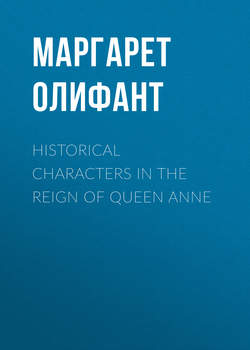Historical Characters in the Reign of Queen Anne

Реклама. ООО «ЛитРес», ИНН: 7719571260.
Оглавление
Маргарет Олифант. Historical Characters in the Reign of Queen Anne
Chapter I. THE PRINCESS ANNE
Chapter II. THE QUEEN AND THE DUCHESS
Chapter III. THE AUTHOR OF “GULLIVER”
Chapter IV. THE AUTHOR OF “ROBINSON CRUSOE”
Chapter V. ADDISON, THE HUMORIST
Отрывок из книги
A YEAR after the accession of William and Mary, and before any of the bitternesses and conflicts above recorded had openly begun, the only child of Anne on whose life any hopes could be built was born. Her many babies had died at birth or immediately after, and their quick and constant succession, as has been said, was the distinguishing feature of her personal life. But after the Revolution, when everything was settling out of the confusion of the crisis, and when as yet no further family troubles had disclosed the family rancors and disagreements, in the country air of Hampton Court, where the new king and queen were living, a little prince was born. Though he was sickly at first, like all the rest, he survived the dangers of infancy, and, called William after the king, and bearing from the first day of his life the title of Duke of Gloucester, was received joyfully by the nation at large and everybody concerned as the authentic heir to the crown. This child kept, it would seem, a little hold on the affections of the childless Mary during the whole course of the quarrel with his mother, bitter as it was, and continued an object of interest and kindness to William as long as he lived. The interposition of the quaint and precocious boy, with his big head, his premature enlightenment as to what it was and was not prudent to say, his sparkle of childish ambition, and all his old-fashioned ways, made a curious and welcome diversion in the troubled scene where nothing was happy, not even the child. He was the chief occupation of Anne’s life when comparative peace followed the warlike interval above related, and a cold and forced civility replaced the active hostilities which for years had been raging between the court and the household of the princess.
Anne has never got much credit for her forbearance and self-effacement at the critical moments of her career. But it is certain that she might have given William a great deal of trouble had she asserted her rights as Mary’s successor, as she might also have done at the time of the first settlement. No doubt he would on both occasions have carried the day, and with this certainty the historians have been satisfied, without considering that a woman who was not of a lofty character, and who was a Stuart, must have felt it doubly bitter to find herself the subject of a gloomy brother-in-law who slighted her, and who, her rasher partizans did not hesitate to say, ought to have been her subject so long as he remained in England after her sister’s death, and not she his. The absence of any attempt on her part to disturb or molest, nay, her little advances, her letters of condolence, and of congratulation the first time that a victory gave occasion for it, showed no inconsiderable magnanimity on the part of the prosaic princess—all the more that she had not been in the habit, as is usual among women, of putting the scorns she had suffered to another woman’s account, and holding Mary responsible, but had uniformly attributed to the “Dutch monster,” the Caliban of her correspondence, all the slights that were put on her—all the more that William did very little to encourage any overtures of friendship. He received her after his wife’s death, and they are said by one of her attendants to have wept together when the unwieldy princess, then unable to walk, was carried in her chair into the very presence-chamber. But if a common emotion drew them together at this moment, it did not last; and in the diminished
.....
The little smoke and whiff of gunpowder, the little gunners at their toy artillery, the great hall still slightly athrill with the mimic salute, add something still to the boundless hopefulness of the scene; for why should not this little English William grow up as great a soldier and more fortunate than his grim godfather, and subdue France under the feet of England, and be the conqueror of the world? All this was possible in those pleasant days.
On another occasion there was a great chapter of Knights of the Garter to witness the installation of little Gloucester in knightly state as one of the order. The little figure, seven years old, seated under the noble canopywork in St. George’s beautiful chapel, scarcely visible over the desk upon which his prayer-book was spread out, gazing with blue eyes intent, in all the gravity of a child, upon the great English nobles in their stalls around him, listening to the voices of the choristers pealing high into space, makes another touching picture. King William himself had buckled the garter round the child’s knee and hung the jewel about his neck,—St. George slaying his dragon, that immemorial emblem of the victory over evil; and no doubt in the vague grandeur of childish anticipation, the boy felt himself ready to emulate the feat of the patron saint. He was a little patriot too, eager to lend the aid of his small squadron to his uncle when William went away to the wars, and bringing a
.....